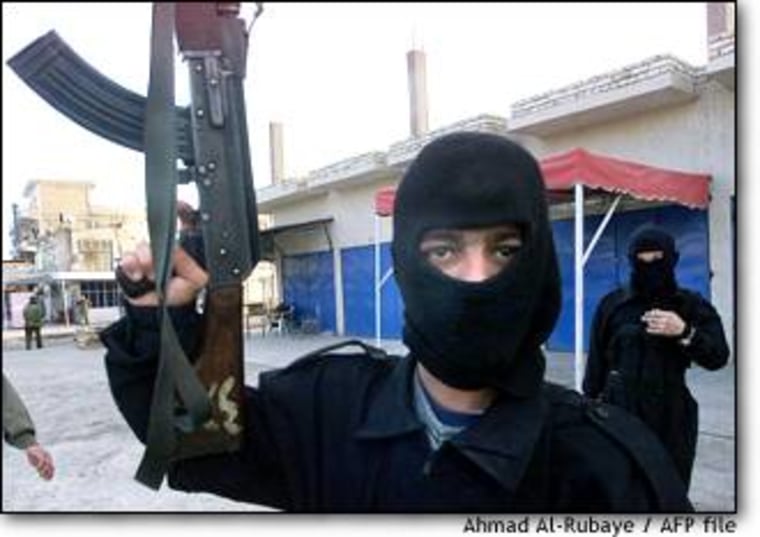As the coalition forces quickly discovered, a strong and dedicated internal security organization exists in Iraq to ensure Saddam Hussein’s brutal grip on the entire country. Old hands liken the control and terror tactics of Saddam’s Baath Party and related groups to that of Nazi Germany, which like Iraq employed levels of military, secret police and political units to keep the population in a constant state of fear. Breaking this grip may prove as hard as the war itself.
The tentacles of Iraq’s ruling Baath Party extend from the major cities to every village and town in the country, not unlike the complex Viet Cong infrastructure that the U.S. military faced during the conflict in Southeast Asia.
Employing ancient tribal techniques, Saddam has extended his control on every level of the bureaucracy, manipulating ethnic divisions, regional rivalries and using nepotism to cement his will. Breaking the grip of this apparatus will be no small job, and from all outward appearances, the United States still has no clear plan on how to proceed.
INSIDIOUS INFLUENCE
The extent to which Saddam’s regime reaches into the lives of its people each and every day cannot be understated. Simply to say that Iraq is a dictatorship is not enough. The Internal Security Organization that Saddam and his Baath Party relies upon to control Iraq includes about 45,000 people, most with the license to dole out brutality as they see fit. Here’s a quick breakdown of its elements:
The Special Security Organization, or SSO, under the direct control of second son and heir apparent Qusay Hussein. This organization is responsible for security in Baghdad and likely controls Iraq’s weapons of mass destruction (WMD) programs and other special sites.
The General Security Division, or GSD, controls the towns and villages and the countryside with well-documented brutality. Empowered now with near-absolute power, GSD units can execute potential defectors at will, and as a result, the general population is terrified of them. The GSD is suspected by military intelligence of summarily executing between four and eight U.S. prisoners of war two weeks ago in Nasiriyah.
The Mukhabarat, the Iraqi Intelligence Service, also has responsibility for counterintelligence and roots out spies and potential defectors at home and abroad.
The Iraqi Army’s Military Intelligence Division (MID) maintains the loyalty of army units. The Iraqi opposition says some 62 regular Army officers were executed by Saddam’s security forces in the northern cities of Mosul and Kirkuk last week, a possible example of their tactics.
These four internal security elements are reinforced by about 7,000 Fedayeen Saddam, a particularly vicious paramilitary force that has conducted suicide attacks against coalition forces and that continues to terrorize the Iraqi populace.
These fedayeen are bolstered by a division of about 18,000 members of the Special Republican Guard, notable for their intense loyalty to Saddam Hussein.
The Republican Guard armored and infantry divisions, now somewhat battered, began the war some 120 thousand-strong and organized into six divisions (the Adnan, Al Nida, Nebuchadnezzar, Hammurabi, Baghdad and Medina divisions). Most now appear to have been pulled back for the defense of Baghdad, but their disposition in the city, and the percentage of them still capable of fighting as organized units after ground engagements and airstrikes, is unknown. U.S. officials have listed the Baghdad and Medina divisions as essentially battered to the point that they are no longer coherent forces.
AFTER THE GUNS FALL SILENT
In order to establish the new Iraq that President Bush speaks of, the grip established by Saddam’s security apparatus must be broken. This task will be difficult and, to my knowledge, the coalition plan on how it will go about doing this is rudimentary at best. In fact, compared with their knowledge of the Iraqi military, the U.S. and British intelligence agencies know comparatively little about the the extent of this Baathist web and potentially acceptable Baath Party members.
Retired Army Lt. Gen. Jay Garner, the head of the Office of Reconstruction and Humanitarian Affairs, is to be the senior U.S. official in postwar Iraq. His office is not equipped to tackle the job of neutralizing the Baathist security web.
The inability of the United States to get a consensus and a working coalition of in-country and expatriate Iraqis on what will happen after the war will bedevil Washington and U.S. military forces. Reports from Washington do not sound encouraging, with factions centered in the Pentagon, State Department and the CIA continuing to advocate their own contradictory solutions.
Not only are they failing to cooperate with each other, these key agencies appear to be actively working against each other, promoting their favored candidates and undermining those they oppose.
The failure to develop a coherent Baath vetting process (akin to the de-Nazification program that turned West Germany into a functioning democracy after World War II) could prove a major problem. “Regime change” was a major stated goal of this war, and many now suspect there is no plan beyond the immediate goal of toppling Saddam’s regime, an eventuality that appears closer every day.
What will replace it? Unfortunately, there exists no clear answer, even at this late date. How will U.S. administrators determine which Iraqi civil servants may continue to serve and which are too tainted to stay? This is key to the Pentagon’s reconstruction and humanitarian assistance plan and the timely departure of U.S. forces.
It took the Allies seven years to construct the Federal Republic of Germany from the ashes of Hitler’s Reich. Remember, Hitler held power for only 12 years. Breaking the habits and corruptions of more than 20 years of rule by Saddam and his Baathist security units may turn out to be a bigger task than driving him from power.
(Gen. Wayne Downing, U.S. Army (ret.), is an NBC News military analyst and former head of U.S. Special Operations Command.)
